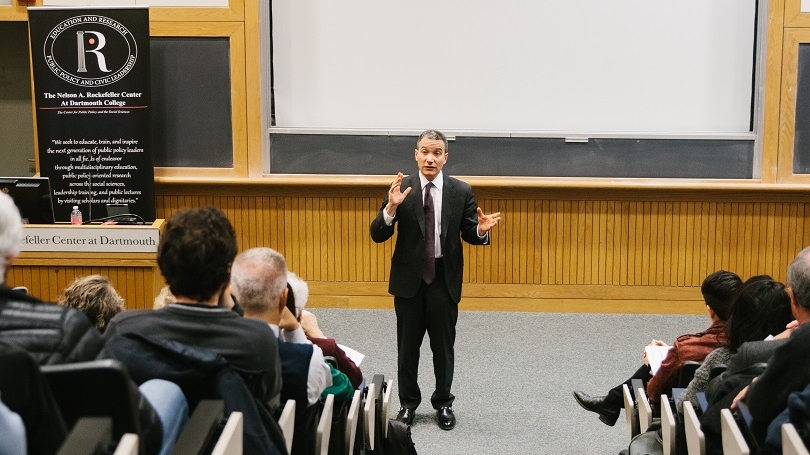
- Public Policy
- Leadership
- Funding
- News & Events
- About the Center
Back to Top Nav
Back to Top Nav
Back to Top Nav
Back to Top Nav
With the passing of Supreme Court Justice Antonin Scalia earlier this month, a seat in the Supreme Court has opened up. The vacancy of his seat removes a critical voice in the contentious decisions that face the Justices of the Supreme Court. Thus, a monumental debate over who should and will succeed Justice Scalia ensues. Connecting current events to the timeless values of the Supreme Court, the Rockefeller Center hosted a lecture by Jeffrey Rosen on the 100th anniversary of the Supreme Court confirmation of Justice Louis D. Brandeis.
Jeffrey Rosen, President and CEO of the National Constitution Center, made a compelling argument that Justice Brandeis can continue to inform us on issues ranging from free speech to the corporations to federal power. Louis D. Brandeis was a great critic of what Rosen calls “the curse of bigness” in business and government since Thomas Jefferson. Thus, Rosen argues that Brandeis’ legacy teaches us about the future of free speech, freedom from government surveillance and the dangers of big banks and corporations who take reckless risks. Other relevant topics that Brandeis wrote about include: technology, monopoly, privacy and Constitutional intricacies.
The National Constitution Center, of which Rosen is President and CEO, is the only institution in America chartered by Congress “to disseminate information about the United States Constitution on a non-partisan basis.” In addition to his work at the National Constitution Center, Rosen is a Professor at The George Washington University Law School. Rosen is a non-resident senior fellow at the Brookings Institution and a moderator for the Aspen Institution, where he conducts seminars and panels on technology, the Constitution and free speech. Rosen is a well-reviewed author and journalist. He is a Contributing Editor for the Atlantic, has written pieces for the New York Times and The New Yorker and has authored several books. Rosen is a graduate of Harvard College; Oxford University, where he was a Marshall Scholar; and Yale Law School.
Submitted by Olivia O'Hagan ’16, Rockefeller Center Student Program Assistant for Public Programs
The views and opinions expressed and any materials presented during a public program are the speaker’s own and do not necessarily represent the views and opinions of the Rockefeller Center or constitute an endorsement by the Center.